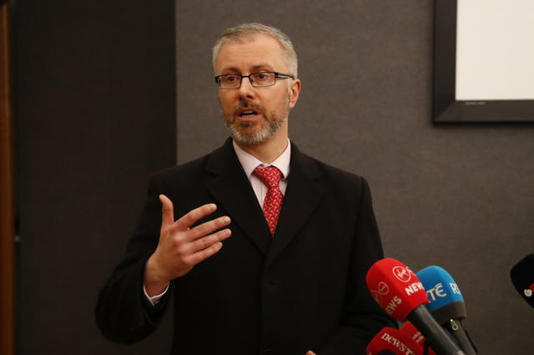DUBLIN,Ireland – An estimated 35,000 international-protection applicants may be housed at any one time across private and State-owned accommodation by 2028, according to new plans.
On Wednesday, the Cabinet signed off a strategy designed to tackle accommodation shortages while reforming the asylum system in the longer term.
The announcement comes amid heightened scrutiny of the Government’s handling of asylum-seeker accommodation, with the State currently not able to provide housing for all male arrivals – in contravention of international commitments.
The new strategy involves quadrupling the commitment for State-owned beds to 14,000 by 2028 when compared with a previous pledge in 2021, as part of a move away from full reliance on private providers.
It is understood this will see the State owning and operating dozens of accommodation centres across the country.
The Department of Integration will give consideration to spreading the accommodation centres around the country in a way that is proportionate to local populations.
This will be complemented by commercially owned centres for contingency and emergency use, with total capacity up to 35,000.
It is understood that there is awareness the need for accommodation may exceed that figure at some point.
In recent years, there has been a significant increase in the number of international applicants arriving in Ireland.
It is projected that there could be up to 16,000 new arrivals every year, up from between 3,000 to 5,000 between 2015-2019.
There are currently around 28,000 people housed by International Protection Accommodation Services (IPAS) and more than 1,400 people waiting on an offer of accommodation.
Integration Minister Roderic O’Gorman said: “It’s clear that the current system for accommodation isn’t working, as since the current system was put in place more than 20 years ago, the State has been almost entirely reliant on private providers.”
Speaking to reporters in Dublin, he added: “We need to have a system where the State holds the reins on accommodation, its location and standards.
“Without this, we can’t put in place the supports for those who arrive here may need. Even prior to the current increase in international-protection applications, the system was desperately in need of reform.”
He said the department will be provided with State lands to “quickly” introduce new accommodation through renovation and rapid-build modular units.
Approximately 40 million euro has been allocated for the strategy next year.
Over the last year, there has been a spate of arson attacks on buildings earmarked or rumoured to be used for housing asylum seekers.
The department said its new approach will allow for improved community engagement around integrating international protection applicants, including limits on what buildings can be used.
It said: “It is the intention of this new strategy to end the use of unsuitable accommodation options currently relied upon, such as the sole hotel remaining in a given town.”
The department said it will be designing new “reception and integration centres” while upgrading existing IPAS buildings.
The Government has also agreed to further extend planning exemptions to allow for the conversion of commercial properties to international-protection accommodation, with a focus on empty office blocks.
Office blocks are mostly expected to be leased, but could be considered for purchase on a case-by-case basis if there are expressions of interest from building owners.
Mr O’Gorman said: “The department is being supported financially by the Department of Public Expenditure through new capital ceilings agreed today, to allow a targeted purchase of medium and larger properties in turnkey or near-current turnkey condition.”
Office blocks are seen as an untapped resource due to the current downturn in the commercial property sector and because their use would not affect the residential market. These buildings are mostly in urban areas already connected with services and transport links.
It is also understood the department is not focusing on the tourism sector for beds.
The department said a number of State-owned sites have been identified, with the first to be brought into use within months.
It was a commitment of the Programme for Government to end the direct-provision system of accommodating those seeking refuge from conflict and persecution.
The department says that its new plan for 14,000 State-owned beds maintains the guiding principles of the White Paper on ending direct provision.
Mr O’Gorman said: “The comprehensive accommodation strategy agreed today by Government will address the immediate accommodation crisis in international protection, and provide a pathway, over the next five years, to deliver a fair, efficient, and sustainable model of accommodating international protection applicants.
“The strategy will allow us to develop a system where the State holds the reins on accommodation, its location and its standards.
By ending the reliance on private providers, and increasing the proportion of State-owned accommodation, we can bring certainty and stability into the system.






